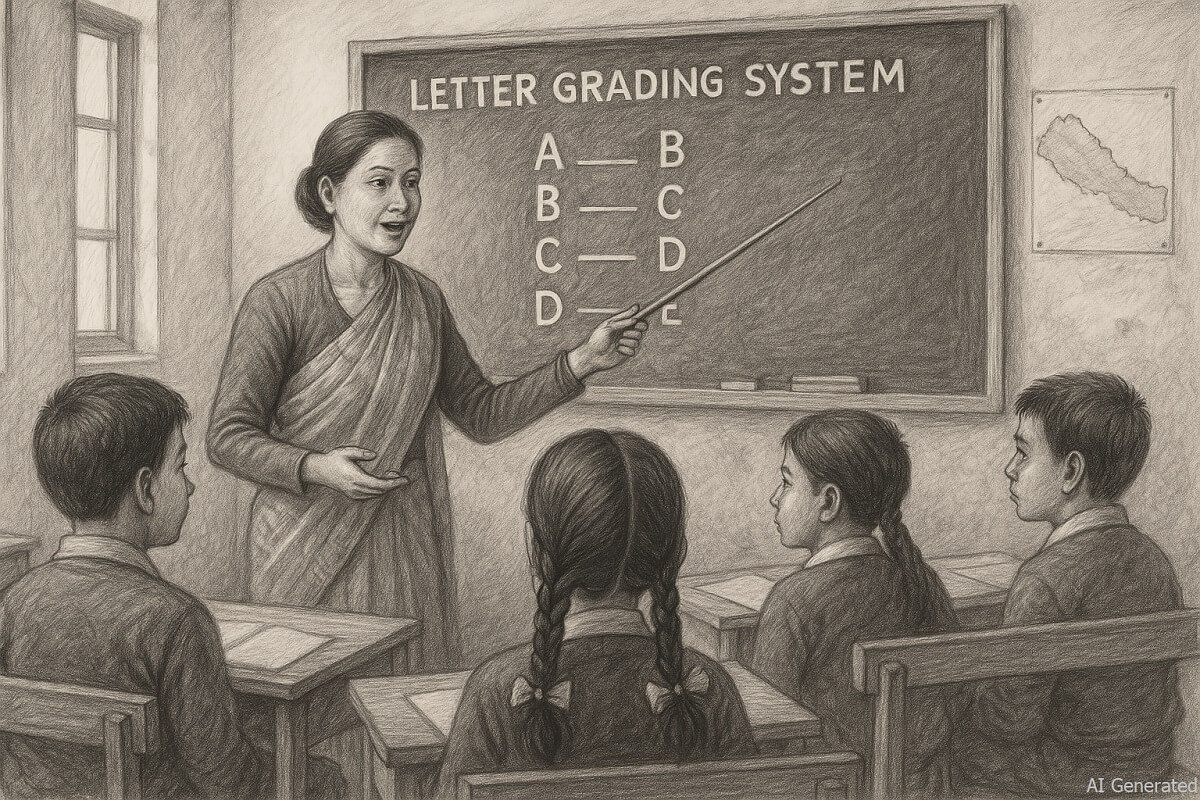
Adoption of the Letter Grading System in Nepal
The letter grading system is a method adopted by most countries globally. Nepal’s education system has replaced the pass-fail model with this new system for publishing results. It was embraced with the belief that it would improve the quality of education and was described as a necessary step toward educational enhancement.
This system does not enhance or detract from the educational process on its own. It simply represents score ranges through letter symbols. While some continue to criticize the system as ineffective, others insist that its adoption is essential. However, periodic contextual improvements are needed.
Effects of the System on Student Experience
Under the letter grading system, students are rarely marked as failed, which helps protect their confidence. Unhealthy competition is also reduced. Students are no longer ranked publicly as first or second. It has been argued that schools with similar curricula and exam structures should be evaluated based on teaching methods, classroom learning, and school environments.
The policy of liberal grade promotion means that students in early grades cannot be failed. Corporal punishment is not permitted, and automatic promotion ensures that even weaker students are able to pass. Consequently, there is growing concern that classroom learning has deteriorated.
Need for Active Implementation in Classrooms
Continuous student assessment, sincere effort from students, and proper implementation by both teachers and learners can ensure effective learning. Real educational improvement happens within classrooms. For this, teachers must possess strong teaching skills and a willingness to teach.
Teachers must prioritize the future of children without focusing on social or financial gains.
Role of School Environment and Home Support
School management must create a good working environment for teachers. Students also need a healthy academic environment to learn effectively.
Challenges at home, such as a lack of parental awareness, indiscipline, lack of time from parents, and emotional neglect, can negatively impact a child’s learning. Hence, every parent must be aware of their child’s future.
The school environment matters. Classrooms should be well-equipped, and facilities such as laboratories, libraries, and subject-specific teachers are essential.
Discussions and Reforms in School Education
Many debates and consultations have taken place regarding school education. Commissions and committees have provided numerous suggestions. Although education has been recognized as a long-term national priority, policy reforms and their implementation have remained weak. As a result, the quality of education continues to decline.
Political leaders and government officials responsible for the education system must not hesitate to consult intellectuals when formulating curricula, textbooks, and educational policies.
Public Schools vs Private Schools
As public schools weakened, private schools gained an opportunity to thrive. The government took over public schools after 1971 but failed to sustain financial support, eventually withdrawing. Public schools were left in a state of neglect.
Both ruling and opposition politicians used education for manipulation. The primary reason for the improvement of private schools compared to public ones is the strong sense of ownership they possess. It is now necessary to instill that same sense of responsibility in public schools by empowering local governments.
Importance of Local Governments and Community Engagement
Nepal’s constitution assigns the responsibility for basic education to local governments. Without the active participation of local authorities and parents, this goal cannot be achieved.
The primary reason why education once surpassed other services in Nepal was strong community involvement. A large number of schools opened over time, especially after 1971. However, teacher competence did not improve. Despite the enthusiasm for opening schools, qualified teachers became increasingly scarce. Many who lacked necessary skills became teachers, leading to a decline in educational quality.
Rise of Privatization in Education
Given Nepal’s economic and political structure, privatization of education has become nearly inevitable. Other sectors have also followed this path. Since the government cannot fully fund education, nationalization is no longer a viable option.
The government must focus on regulating and disciplining private schools. Unchecked school openings and yearly tuition hikes must be controlled. Scholarship quotas must also be established, and private schools must operate under government regulations.
Ensuring Access and Equity in Education
The constitution defines basic education as a fundamental right. Education must be made accessible, and additional support should be provided for children from impoverished families.
It is essential to professionalize the academic administration of private schools quickly. At the same time, public schools must be equipped with high-quality educational resources. The quality of public schools will not improve by simply controlling private institutions.
Public and Private Schools: A Balanced Policy
It is true that private schools should be supported. At the same time, there must be a clear policy to equip public schools with academic resources.
This requires increased investment and participation from the central, provincial, and local governments, as well as communities, schools, parents, teachers, and students. Educational administration must become impartial, honest, professional, and capable.
Public schools have weakened due to insufficient government investment. The government only provides salaries and limited administrative expenses. Where will the schools find additional funds? This situation has emerged because of both government and political parties. Populist slogans promising free education were introduced without considering practical realities.
Lack of Monitoring and Decision-Making Authority
The government has not been able to monitor its own educational provisions effectively. Although there is opposition to giving local governments the authority to appoint and remove teachers, they are the ones who are directly involved with schools.
Denying them this authority creates difficulty in maintaining discipline and order. Instead of making random decisions, it is important to conduct sustainable discussions and reach well-thought-out conclusions.
Need for Broader Dialogue on Education
As a sensitive issue, education requires broad discussion on its various aspects. Relying on a few individuals, classes, or groups to make decisions has historically led to impractical policies and programs.
Therefore, insights from long-term discussions at the village and district levels must be synthesized, analyzed, and used to form final conclusions.


